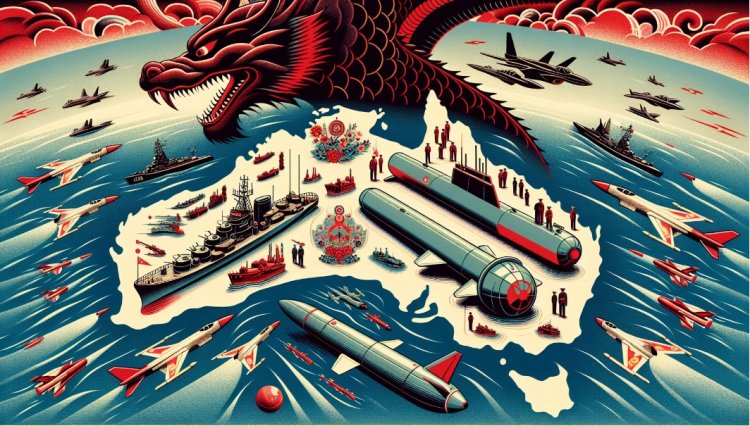The war between China and Australia is closer than you might think.
Australia's Military Buildup Against China: AUKUS, Geopolitics, and National Security. "Discover the escalating tensions and looming threat of a war between China and Australia. Understand the causes, potential impacts, and global implications of this near-approaching conflict."

Introduction
In recent news, the AUKUS deal has gained significant attention due to its implications for Australia's military buildup and the tensions with China. This deal, which involves the United States, the United Kingdom, and Australia, allows for the sale of nuclear-powered submarines to Australia and marks the first time that the US has shared its highly classified nuclear submarine technology with an ally publicly. The significance of this arrangement cannot be understated.
Australia's military buildup has been a topic of discussion over the past few years, as the country has taken significant measures to increase its military presence and budget. The perceived threat from China, which has been aggressively arming itself and pursuing confrontational foreign policies, is what motivates this preparation. The tensions between Australia and China have escalated, leading to concerns about national security.
Understanding the dynamics of geopolitics is crucial to comprehend the motivations behind Australia's actions. Geopolitics refers to the study of how geography, economics, and politics intersect to shape international relations and power struggles between nations. As China seeks to expand its influence and establish military bases, Australia faces the reality of dealing with a more formidable Chinese military presence than ever before.
National security is of the utmost importance to any country, and Australia is no exception. With its decision to confront China and stand up to other nations, Australia is taking measures to protect its interests and ensure its sovereignty. The increase in defense spending, the acquisition of nuclear submarines, F-35A lightning aircraft, and anti-ship missiles, and the presence of permanent American military forces on Australian soil all reflect the country's commitment to safeguarding its future.
In the following sections, we will delve deeper into the AUKUS deal, Australia's military buildup, the tensions with China, and the significance of understanding geopolitics and national security in this complex landscape.
China's Military Buildup and Aggressive Behaviour
China's increasing military capabilities and confrontational foreign policy has raised concerns about its aggressive behavior on the global stage. The country's military buildup poses a significant threat to nations, including Australia.
China's aggressive behavior can be seen in its bullying tactics towards other nations. The country has a history of imposing trade sanctions on countries that don't align with its interests. China's trade sanctions have targeted countries such as Canada, Japan, Lithuania, Mongolia, Norway, the Philippines, South Korea, and Taiwan.
The U.S. Defence Secretary, Lloyd Austin, has labeled China's behavior as "bullying." This aggressive behavior, combined with China's military buildup, poses a direct threat to Australia's national security.
Australia's response to China's aggression has been to increase its military capabilities and strengthen its alliances. The country has significantly increased its defense spending, with the 2023–24 annual defense funding exceeding $50 billion, reflecting its commitment to protecting its interests.
One example of Australia's efforts to counter China's aggression is the AUKUS deal. This strategic defense alliance between Australia, the United Kingdom, and the United States aims to build a fleet of nuclear-powered submarines for Australia. It is the first time the U.S. has shared its highly classified nuclear submarine technology with an ally publicly.
China's response to the AUKUS alliance and Australia's military buildup has been hostile. The relationship between China and Australia has deteriorated, with China perceiving Australia as a threat. China's aggressive behavior and military presence in the Indo-Pacific region have intensified the tensions.
Australia's decision to arm itself and strengthen its alliances reflects the country's commitment to safeguarding its national security. The cost of inaction and allowing China to achieve its goals is too significant to ignore.
China's Economic Coercion and Australia's Response
Background to Australia's inquiry into COVID-19 origins: The tensions between Australia and China escalated when Australia endorsed an inquiry into the origins of COVID-19, which angered China. China warned Australia of the consequences and launched a campaign of economic coercion against the country.
China's economic coercion against Australia: China imposed trade bans and sanctions on Australian goods as a form of retaliation. As Australia's biggest trading partner, China's actions targeted industries such as barley and coal, causing disruptions in the Australian export industry.
Australia's reliance on China for exports: Australia had a significant economic reliance on China, with 8.2% of its GDP tied to Chinese trade in 2020. However, China's trade bans backfired as many affected exporters found alternative markets, and China had to resort to buying from other countries at a higher cost.
Consequences of China's trade bans: The trade bans hurt industries such as the lobster and wine industries in Australia. However, China's actions also highlighted the need for Australia to diversify its export markets and reduce its economic dependence on China.
Australia's resilience and adaptation to new markets: Despite the disruptions caused by China's trade bans, Australia demonstrated resilience by finding alternative markets for its goods. Australian exporters successfully sold products such as barley and coal to other Asian countries, mitigating the economic impact of China's actions. This adaptability and ability to find new markets reflect Australia's commitment to safeguarding its economic interests.
China's military threat to Australia
China's growing influence in the Pacific region is a major concern for Australia's national security. As China seeks to expand its influence and establish military bases, Australia faces the reality of dealing with a more formidable Chinese military presence than ever before.
One of the key concerns for Australia is the potential establishment of a Chinese naval base near its shores. This would place Chinese troops and warships within 1200 miles of the Australian coast, posing a significant security threat. The proximity of Chinese military forces raises the risk of conflict and escalations that could directly impact Australia's sovereignty.
The recent acts of aggression in the South China Sea serve to further highlight the threat that China poses. From cutting across the nose of an Australian aircraft to flying dangerously close to a US Air Force plane, China's aggressive and unprofessional flying behavior signals a disregard for international norms and poses a direct challenge to regional stability.
To counter China's growing power and aggression, Australia has recognized the need for a strong defense. The country has significantly increased its defense spending, with the annual defense funding for 2023–24 exceeding $50 billion. This increase in funding reflects Australia's commitment to protecting its interests and ensuring its national security.
The AUKUS deal, a strategic defense alliance between Australia, the United Kingdom, and the United States, plays a crucial role in countering China's military threat. The deal involves the development of a fleet of nuclear-powered submarines for Australia, marking the first time the US has shared its highly classified nuclear submarine technology with an ally publicly.
China's hostile response to the AUKUS alliance and Australia's military buildup further underscore the significance of countering China's power. The deteriorating relationship between China and Australia, fueled by China's perception of Australia as a threat, necessitates a strong defense and a commitment to safeguarding national security.
In conclusion, China's military buildup, growing influence in the Pacific region, recent acts of aggression, and economic coercion pose a significant threat to Australia's national security. Australia's response to this threat includes a strong defense, an increase in defense spending, and strategic alliances such as AUKUS. Australia needs to counter China's power and protect its interests to ensure a secure future.
AUKUS: Australia's Defence Alliance
The AUKUS arrangement, a strategic defense alliance between Australia, the United Kingdom, and the United States, has gained significant attention due to its implications for Australia's military buildup and tensions with China.
Explanation of the AUKUS arrangement
AUKUS involves the sale of nuclear-powered submarines to Australia and marks the first time the US has publicly shared its highly classified nuclear submarine technology with an ally. This alliance aims to build a fleet of nuclear-powered submarines for Australia and strengthen military cooperation in the Indo-Pacific region.
Benefits of nuclear submarines for Australia
The acquisition of nuclear submarines provides Australia with advanced capabilities, including longer range, increased speed, and enhanced stealth. These submarines are harder to detect and can effectively deter potential aggressors, enhancing Australia's national security.
The significance of the US sharing nuclear technology
The US sharing its nuclear submarine technology with Australia underscores the strength of the alliance and highlights the trust and cooperation between the two countries. This sharing of technology enhances Australia's defense capabilities and strengthens its position in the region.
Statements from UK and US leaders on AUKUS
UK and US leaders have emphasized the importance of the AUKUS alliance in maintaining a free and open Indo-Pacific. President Joe Biden has stated that the alliance is necessary to counter China's recklessness and ensure regional stability.
Debate over deterrence vs. catalytic behaviour
The establishment of the AUKUS alliance has led to debate over whether it is a deterrent to China's aggressive behavior or a catalyst for further tensions. China perceives the alliance as a threat and feels cornered, potentially leading to escalations. However, the alliance aims to deter China's reckless actions and protect the interests of its member countries.
China's Response and Regional Implications
China's negative response to the AUKUS alliance and Australia's military buildup has further escalated tensions between the allies and China. China perceives Australia as a threat and has responded with hostile actions.
The deteriorating relationship between China and Australia is a result of China's aggressive behavior, including trade sanctions and military presence in the Indo-Pacific region. China's bullying tactics towards other nations have raised concerns about its intentions and pose a direct threat to Australia's national security.
China's military buildup and confrontational foreign policy have intensified the regional dynamics in the Indo-Pacific region. As China seeks to expand its influence and establish military bases, Australia and its allies are faced with a more formidable Chinese military presence than ever before.
The AUKUS alliance, which involves Australia, the United Kingdom, and the United States, plays a crucial role in countering China's military threat. The alliance aims to build a fleet of nuclear-powered submarines for Australia, marking the first time the US has shared its highly classified nuclear submarine technology with an ally publicly.
China's response to the AUKUS alliance and Australia's military buildup has further strained relations between China and its regional neighbors. The alliance presents a powerful defense network in the Indo-Pacific region, challenging China's dominance.
Japan's support for the AUKUS alliance is significant in shaping regional dynamics. Japan, being a key player in the region, recognizes the need to counter China's military expansion and aligns itself with Australia, the United Kingdom, and the United States.
In conclusion, China's negative response to the AUKUS alliance and Australia's military buildup have heightened tensions in the Indo-Pacific region. China's aggressive behavior and military presence pose a direct threat to Australia's national security. The AUKUS alliance and Japan's support play a crucial role in countering China's military threat and reshaping regional dynamics.
Australia's Expensive Defence Buildup
Australia's military buildup comes at a significant cost. The country has increased its defense spending, with the annual funding for 2023–24 exceeding $50 billion. This represents over 2% of Australia's GDP, reflecting the country's commitment to protecting its interests and ensuring national security.
The shift in perception from a benign middle power to a more impactful player is a driving force behind Australia's increased defense spending. The rise of a muscular China under President Xi Jinping and its aggressive behavior have undermined Australia's assumptions of security and necessitated a stronger military presence.
China's military buildup, coupled with North Korea's nuclear ambitions, has heightened concerns about regional security. The risk of conflict and the potential threats to Australia's sovereignty have forced the country to take action.
The AUKUS deal, which involves the acquisition of nuclear-powered submarines, is a significant part of Australia's defense buildup. This strategic alliance with the United States and the United Kingdom marks the first time the US has publicly shared its highly classified nuclear submarine technology with an ally. The benefits of these advanced submarines include longer range, increased speed, and enhanced stealth, which will enhance Australia's national security.
The importance of national security cannot be understated. The need to safeguard its interests and ensure a secure future is what led Australia to confront China and strengthen its alliances. The cost of inaction and allowing China to achieve its goals is too significant to ignore.
Australia's increased defense spending and military buildup are a response to the perceived threat from China and a commitment to safeguarding national security. The country's preparation for potential conflict reflects the complex dynamics of geopolitics and the need for strategic alliances and advanced military capabilities.
Conclusion
In conclusion, the AUKUS deal and Australia's military buildup in response to China's aggressive behavior and military threat have significant implications for national security and the geopolitical landscape. The tensions between Australia and China, fueled by China's trade sanctions, military presence, and aggressive foreign policies, have necessitated strong defense and strategic alliances.
The AUKUS deal, a strategic defense alliance between Australia, the United Kingdom, and the United States, marks a significant step in countering China's military threat. The acquisition of nuclear-powered submarines, F-35A lightning aircraft, and anti-ship missiles, along with the presence of permanent American military forces on Australian soil, reflects Australia's commitment to protecting its interests and ensuring national security.
Understanding the dynamics of geopolitics is crucial to comprehend the motivations behind Australia's actions. Geopolitics refers to the study of how geography, economics, and politics intersect to shape international relations and power struggles between nations. With China seeking to expand its influence and establish military bases, Australia faces the reality of dealing with a more formidable Chinese military presence than ever before.
The importance of national security cannot be understated. The need to safeguard its interests and ensure a secure future is what led Australia to confront China and strengthen its alliances. The cost of inaction and allowing China to achieve its goals is too significant to ignore.
As tensions continue to escalate between Australia and China, ongoing monitoring and analysis of the situation is crucial. Australia must remain vigilant in safeguarding its national security and be prepared to adapt its defense strategies as the geopolitical landscape evolves.
In conclusion, the AUKUS deal, Australia's military buildup, and the tensions with China highlight the significance of understanding the geopolitical landscape and the importance of national security in the face of threats. Australia's commitment to safeguarding its future and protecting its interests is a testament to the complex dynamics of geopolitics and the need for ongoing monitoring and analysis.



 admin
admin 










